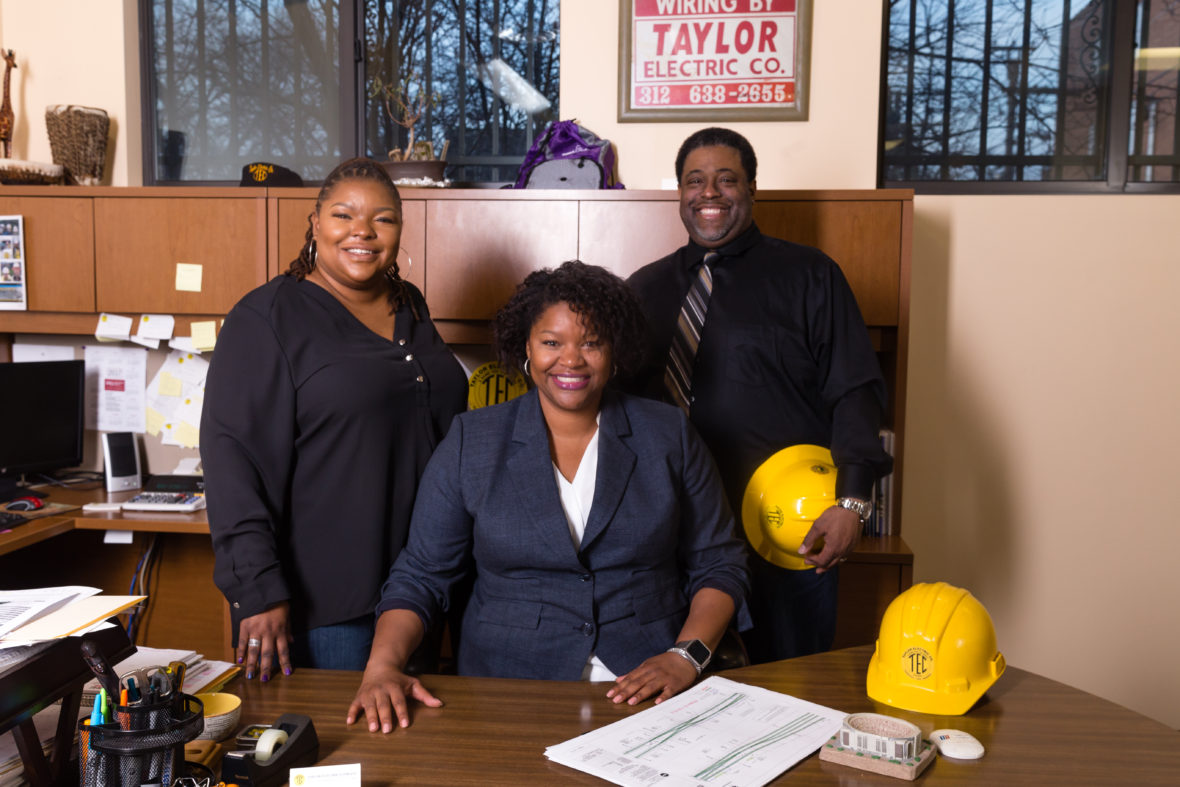Taylor Electric’s Fourth Generation Carries on the Legacy of a Name You Can Trust in Electrical Construction
- Posted: August 18, 2020
- better careers, better communities, better construction, Black Contractors, Bryan Taylor, Chicago Fire Department’s Engine Company 115, Karen Michele, Karen Michele Dinkins, Kendra Dinkins, Kenneth Dinkins, Martha Taylor, Owners and Executives (BCOE) March of Dimes, Rufus Taylor, Sam Taylor, Taylor Electric
According to a Harvard Business Review article published in 2012, approximately 70 percent of family-owned businesses fail or are sold before the second generation has a chance to take over. By the third generation, only 10 percent still exist. With an outlook as bleak as that, the story didn’t bother to document how many family-owned companies remain viable by the time the opportunity arrives for a fourth generation, but it’s a certainty that the number would be miniscule. That’s what makes Chicago-based contractor Taylor Electric so remarkable. With the family’s third and fourth generations now leading the company, Taylor Electric is a Chicago institution as the oldest African-American owned and operated construction firm in the city.
To understand how Taylor Electric has defied the odds as a family-owned business, it’s necessary to understand who paved the way for what the company is today. Its story starts in the first two decades of the 1900s with Sam Taylor, who learned how to perform electrical work without the benefit of an apprenticeship, which was nearly impossible for an African-American to obtain at the time. After building his skills by working for others, Sam founded Taylor Electric out of a wooden shack on Chicago’s South Side in 1922, sometimes sleeping on job sites with a shotgun to prevent vandalism. Preferring to work with handshake deals instead of written contracts, Sam knew that his word and the quality of his work were the factors most important to the company’s success.
By the time Sam’s son Rufus joined the business in 1958 as an IBEW Local 134 apprentice to learn the trade from the ground up, Taylor Electric’s reputation had enabled its growth through word of mouth as it successfully completed job after job, never compromising on its commitment to listen to customers, avoid overpromising and complete the work the right way. Over the course of the next 37 years, Rufus took Taylor Electric to new heights as a consummate networker who, like his father, delivered exactly what he said he would on every project. As the first African-American man to sit on the board of ECA Chicago, Rufus ensured that Taylor Electric quite literally had a seat at the table in Chicago’s electrical construction industry. Under his leadership and building on a track record of successful work in the residential and light industrial markets in the years since its founding, the company began to take on larger projects at hospitals, manufacturing plants, schools and multifamily housing complexes. Also instrumental in Taylor Electric’s rise was his sister, Jessie Dinkins, who managed the company’s back office for 20 years.
In 1995, after Rufus passed away, leadership of Taylor Electric transitioned to the family’s third generation as Rufus’ daughter Martha Taylor moved into the president and CEO position and Jessie’s son Kenneth Dinkins took on the supervision and oversight of all field operations. They continued to build Taylor Electric’s capabilities while ensuring that the company’s commitment to quality work done with integrity remained the driving force in all business decisions. It was during these years that Taylor’s current President/CEO and Executive Vice President/COO, Kendra Dinkins and Karen Michele Dinkins, respectively, joined the company, though their paths into the business were quite different.
Immediately after graduating from Western Illinois University, where she studied public communications and human relations, Karen Michele Dinkins began working at Taylor Electric as a secretary. After a successful period in the role, she was promoted to office manager, where she handled all human resources needs and trained and oversaw the company’s office staff.
Kendra, on the other hand, started her career in an entirely different field. After graduating from Shaw University with a degree in biology, she pursued a career as an educator. In 2007, while working as a teacher in North Carolina, she moved back to Chicago for what was meant to be a temporary role as Taylor Electric’s bookkeeper.
“My dad asked me to come and work the books temporarily in 2007 and I’ve been here ever since,” she says. “I started off as the bookkeeper right before the recession hit, and our office had to shrink at the time because of the economic downturn. I started taking on more and more roles as a result and ended up controlling the manpower, working with the estimators and project managers, and with the customers. After several years of this, when our cousin Martha was ready to retire as the president and CEO, it was a natural transition for me to take over as president.”
In 2015, the transition to the fourth generation of the family became official as Kendra was elevated to President/CEO and Karen Michele became executive vice president and COO. Working alongside them was and continues to be Bryan Taylor, Rufus’ son, who began working as a summer helper for Taylor Electric in 1988 before becoming a journeyman electrician. With years of experience working in the field and a stint as a purchasing agent, Bryan now serves as Taylor Electric’s foreman, overseeing the company’s day-to-day electrical work in the field.

Under their leadership, and with the help of several other family members who work at the company, Taylor Electric has continued to serve as a trusted partner for projects at some of Chicago’s most recognizable landmarks. Focusing largely on vertical commercial and residential/hospitality projects, along with facilities maintenance of large-scale venues with complex electrical components, Taylor Electric works at Guaranteed Rate Field and Soldier Field – relationships that are more than 25 years old – and at places like Navy Pier, O’Hare International Airport and Northerly Island, among others.
In recent months, the company has been involved in the construction of a new fire station for the Chicago Fire Department’s Engine Company 115. Located in the West Pullman neighborhood, the $30 million facility will be the second largest fire station in the city and provide first responders with the latest technology and tools needed to keep Chicagoans safe. According to Kendra, the project is representative of what excites her about leading Taylor Electric as it approaches its 100th year in business.
“Our work on the new fire station is the first time in a while we’ve done a project like that,” she says. “Getting the chance to try new things and branch out, while also being able to help in communities that really need it, is a great thing. We’re really excited to be a part of it.”
A commitment to lifting up communities that reaches well beyond construction sites is one of the defining features across the generations of Taylor Electric. During his time leading the company, Rufus raised thousands of dollars for the March of Dimes, and Kendra, Karen Michele and other family members carry on that legacy today by playing an active role in a variety of philanthropic initiatives. Kendra has co-chaired the annual March of Dimes Construction and Transportation Award Luncheon and Taylor Electric launched their own “Go Pink” campaign in 2016 to raise awareness of breast cancer and generate donations for the University of Chicago’s Cancer Research Center. As one of the city’s leading black-owned and operated businesses, Taylor Electric has also been instrumental in convening other black business owners in the construction industry as a charter member and lead organizer of Black Contractors, Owners and Executives (BCOE), a nonprofit organization that exists to bring people together to discuss, explore, promote and lobby for increased opportunities and equal success for African-American contractors in the construction industry.
Kendra, who is the current president of BCOE, says, “Even as a 98-year-old company, we have to battle as a black-owned business in the industry against the stigma that we won’t be able to cut it. That being said, we have been in the game for almost a century, and there are things that our family has learned that we definitely want to pass on to others in the industry. There are plenty of other companies out there that can come up if they really want to. And we want to help them remove the barriers in the way of getting there.”

